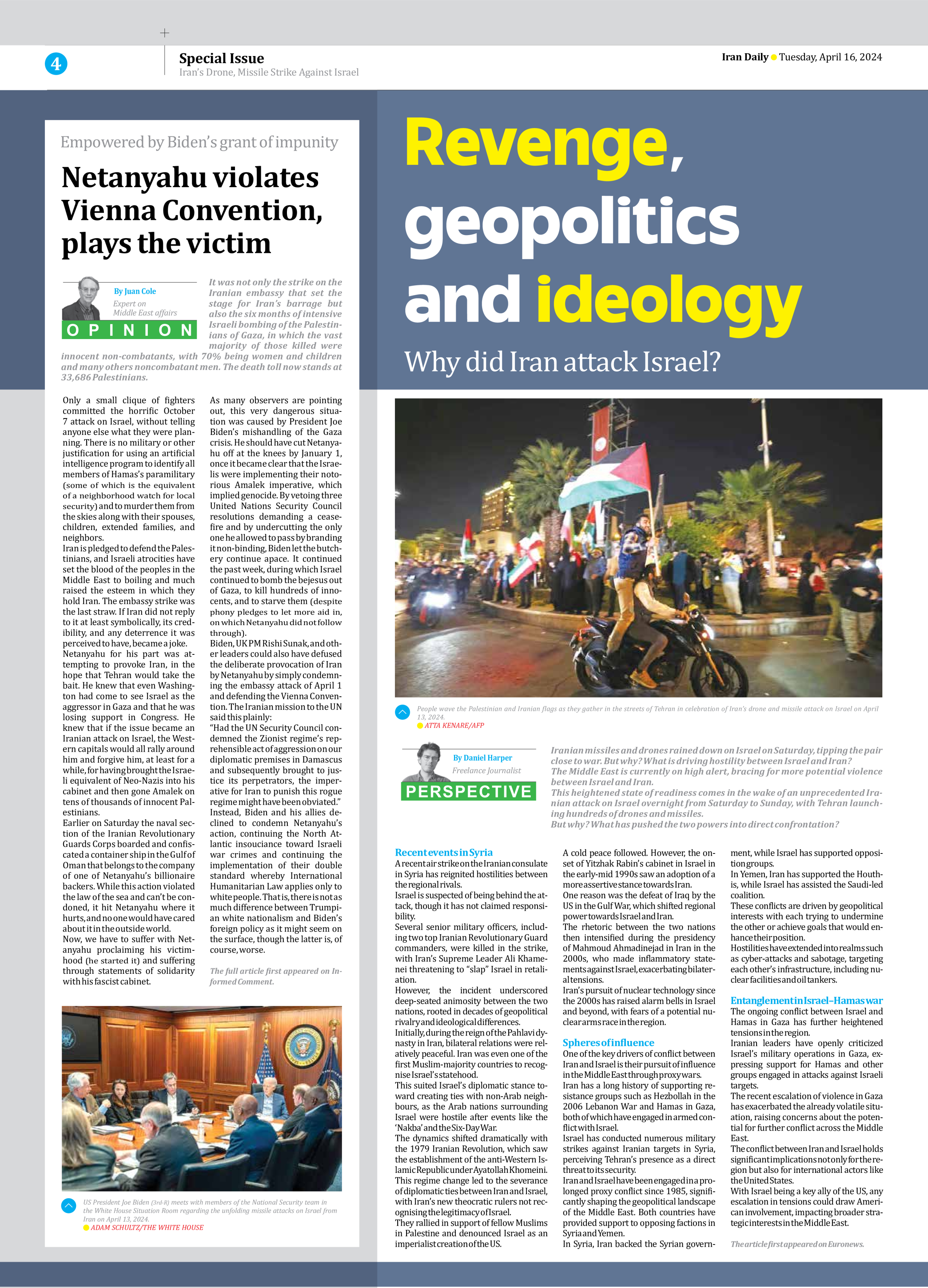
Revenge, geopolitics and ideology
Why did Iran attack Israel?
Iranian missiles and drones rained down on Israel on Saturday, tipping the pair close to war. But why? What is driving hostility between Israel and Iran? The Middle East is currently on high alert, bracing for more potential violence between Israel and Iran. This heightened state of readiness comes in the wake of an unprecedented Iranian attack on Israel overnight from Saturday to Sunday, with Tehran launching hundreds of drones and missiles. But why? What has pushed the two powers into direct confrontation?
By Daniel Harper
Freelance Journalist
Recent events in Syria
A recent air strike on the Iranian consulate in Syria has reignited hostilities between the regional rivals.
Israel is suspected of being behind the attack, though it has not claimed responsibility.
Several senior military officers, including two top Iranian Revolutionary Guard commanders, were killed in the strike, with Iran’s Supreme Leader Ali Khamenei threatening to “slap” Israel in retaliation.
However, the incident underscored deep-seated animosity between the two nations, rooted in decades of geopolitical rivalry and ideological differences.
Initially, during the reign of the Pahlavi dynasty in Iran, bilateral relations were relatively peaceful. Iran was even one of the first Muslim-majority countries to recognise Israel’s statehood.
This suited Israel’s diplomatic stance toward creating ties with non-Arab neighbours, as the Arab nations surrounding Israel were hostile after events like the ‘Nakba’ and the Six-Day War.
The dynamics shifted dramatically with the 1979 Iranian Revolution, which saw the establishment of the anti-Western Islamic Republic under Ayatollah Khomeini.
This regime change led to the severance of diplomatic ties between Iran and Israel, with Iran’s new theocratic rulers not recognising the legitimacy of Israel.
They rallied in support of fellow Muslims in Palestine and denounced Israel as an imperialist creation of the US.
A cold peace followed. However, the onset of Yitzhak Rabin’s cabinet in Israel in the early-mid 1990s saw an adoption of a more assertive stance towards Iran.
One reason was the defeat of Iraq by the US in the Gulf War, which shifted regional power towards Israel and Iran.
The rhetoric between the two nations then intensified during the presidency of Mahmoud Ahmadinejad in Iran in the 2000s, who made inflammatory statements against Israel, exacerbating bilateral tensions.
Iran’s pursuit of nuclear technology since the 2000s has raised alarm bells in Israel and beyond, with fears of a potential nuclear arms race in the region.
Spheres of influence
One of the key drivers of conflict between Iran and Israel is their pursuit of influence in the Middle East through proxy wars.
Iran has a long history of supporting resistance groups such as Hezbollah in the 2006 Lebanon War and Hamas in Gaza, both of which have engaged in armed conflict with Israel.
Israel has conducted numerous military strikes against Iranian targets in Syria, perceiving Tehran’s presence as a direct threat to its security.
Iran and Israel have been engaged in a prolonged proxy conflict since 1985, significantly shaping the geopolitical landscape of the Middle East. Both countries have provided support to opposing factions in Syria and Yemen.
In Syria, Iran backed the Syrian government, while Israel has supported opposition groups.
In Yemen, Iran has supported the Houthis, while Israel has assisted the Saudi-led coalition.
These conflicts are driven by geopolitical interests with each trying to undermine the other or achieve goals that would enhance their position.
Hostilities have extended into realms such as cyber-attacks and sabotage, targeting each other’s infrastructure, including nuclear facilities and oil tankers.
Entanglement in Israel–Hamas war
The ongoing conflict between Israel and Hamas in Gaza has further heightened tensions in the region.
Iranian leaders have openly criticized Israel’s military operations in Gaza, expressing support for Hamas and other groups engaged in attacks against Israeli targets.
The recent escalation of violence in Gaza has exacerbated the already volatile situation, raising concerns about the potential for further conflict across the Middle East.
The conflict between Iran and Israel holds significant implications not only for the region but also for international actors like the United States.
With Israel being a key ally of the US, any escalation in tensions could draw American involvement, impacting broader strategic interests in the Middle East.
The article first appeared on Euronews.







